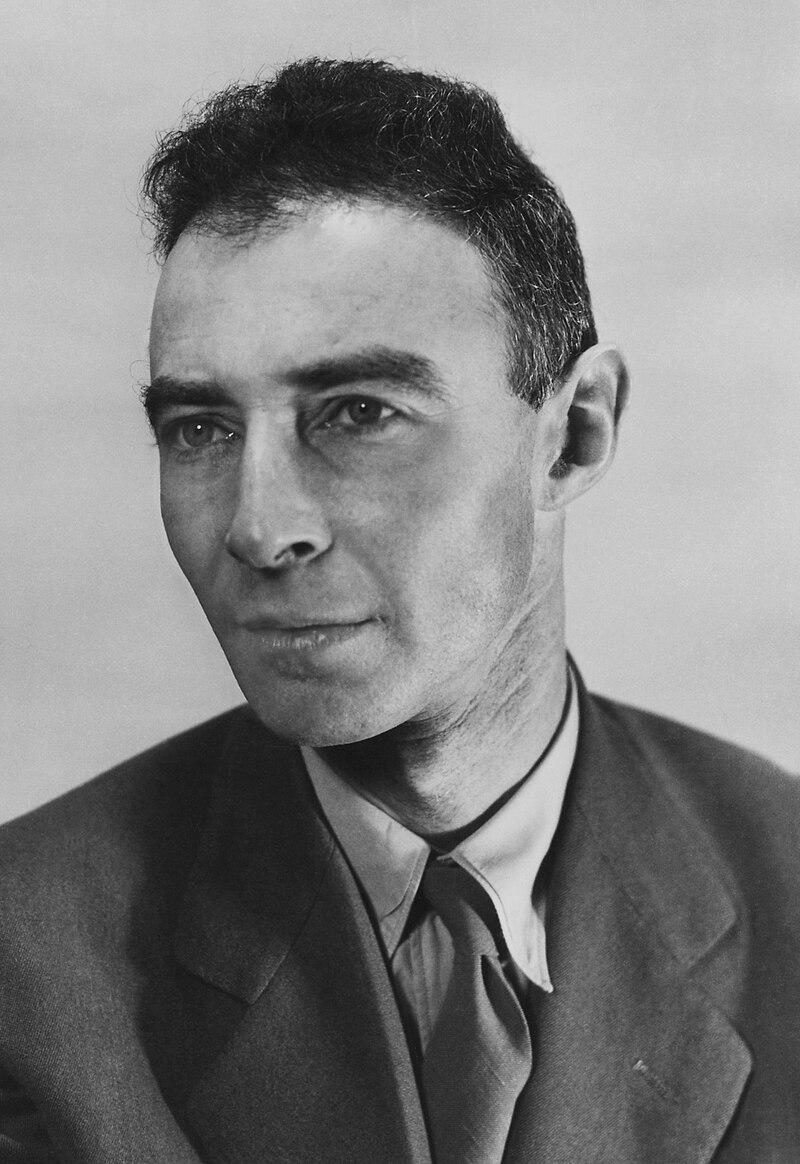There were concerns at Oppenheimer being made the director of the Manhattan Project as several Nobel Prize winning scientists working at the project would be reporting to him, while Oppenheimer did not enjoy the status of being a Nobel Prize winner.
The brilliant scientist J. Robert Oppenheimer was an avid student of Eastern religions—Hinduism and Confucianism. He was a brilliant physicist, but wasn’t satisfied with a physics dominant world view, and had an intrinsic urge to understand the cosmos in its entirety, including the origin of physics itself. In his diligence to understand the fundamentals of existence, he met with their philosophical underpinning in the Bhagavad Gita. To read and study Bhagavad Gita in its original form, he learned Sanskrit. With such diligence in his karmas, it is no wonder that he was singularly successful in his pursuits, including the daunting Manhattan Project. It was a project of nuclear physics that changed the world forever. Yet, Oppenheimer was not awarded the Nobel Prize for physics, despite being nominated thrice, in 1946, 1951 and 1967. Nomination for the prize notwithstanding, Oppenheimer’s scientific status eminently deserved it.
RECRUITING OPPENHEIMER
As the United States entered World War II, following Japan’s unprovoked attack on Pearl Harbor in December 1941, there was an atmosphere of suspicion that Germany’s dictator Hitler had initiated a program to manufacture the nuclear bomb. Meanwhile, however, the US and the UK had their own nuclear programs underway, alerted by the refugee scientists who had left Hitler’s Germany. As early as August 1939, physicists Leo Szilard and Eugene Wigner had drafted a letter, to warn the US administration of the potential development of “extremely powerful bombs of a new type” (by Germany) and to take steps to acquire uranium ore reserves and accelerate the research into nuclear chain reactions, warning that the Nazis might be developing it. Szilard and Wigner then persuaded Albert Einstein to sign the letter, and delivered it to the President of the US, Franklin D. Roosevelt.
Events moved fast after the US joined the war, leading to the approval of the Manhattan Project, headed by Brigadier General Leslie Groves to make the atomic bomb. He was instrumental in recruiting Oppenheimer for the project, and later his appointment as the director of Project Y that made and conducted the Trinity test for the bomb. There were concerns at Oppenheimer being made the director of the project because of his left wing sympathies and the fact that several Nobel Prize winning scientists working at the project would be reporting to him, while Oppenheimer did not enjoy the status of being a Nobel Prize winner. Leslie even ignored the fact that Oppenheimer’s girlfriend Jean Tatlock was a member of the Communist Party. Oppenheimer’s association with Tatlock was questioned during the inquiry leading to withdrawal of his security clearance in the post war McCarthy era.
But Leslie saw practical side in Oppenheimer’s working, as one who knew how to put things together. In hindsight, it was a brilliant choice, for “Team Oppenheimer” successfully completed the project in a perceived race against the Germans who had the head start of years of working on the nuclear bomb. Eventually the Trinity test for explosion of the device was done on 16 July 1945. The expected intensity of underground explosion was equivalent to 0.3 kilotons of TNT, but the blast took place with an intensity of 24.8 ± 2 kilotons of TNT. No wonder, Oppenheimer recalled Lord Krishna, Vishnu’s avatar, in Bhagavad Gita to say, “I am become death, the destroyer of the world.” The allusion here is not to Oppenheimer as a person, but to the manifestation of the perceived cosmic power of destruction.
NOBEL PRIZE EVADES OPPENHEIMER
Yet it is an intriguing fact that the one at the centre of manifestation of the cosmic power of destruction failed to get the Nobel Prize. Oppenheimer himself took it in his stride and said that creating an atomic bomb was more inventive than scientific, according to an article in Life in 1949. What did he mean by this? He was referring to the fact that the making of atomic bomb emanated from the scientific research of many scientists that he had grasped to put together a consequential gadget—the bomb. Putting together a technology is not in the same class as pure research, for example, the discovery of nuclear fission in 1938 by Otto Hahn along with Fritz Strassmann, Lise Meitner and Otto Robert Frisch, that made the bomb possible. But the Nobel Prize Committee was more concerned about the association of the bomb with World War 2—it was no noble act and wreaked havoc on the twin Japanese cities of Hiroshima and Nagasaki. Alfred Nobel’s will stated that the “…prizes (be awarded) to those who, during the preceding year, have conferred the greatest benefit to humankind”. On the touchstone of benefit to mankind, the atomic bomb was of doubtful veracity. Oppenheimer himself suffered depression after seeing the devastating effects of the two atomic bombs, named Little Boy and Fat Man, dropped on the cities of Hiroshima and Nagasaki. He opposed the next level research on the even more destructive hydrogen bomb. The events led to the withdrawal of Oppenheimer’s security clearance.
A WARNING
This brings us to a contemporary issue. Potentially destructive technologies must be handled with care. Artificial Intelligence is taking over our lives faster than imagined. The inventors of Chat GPT have been warning us to go slow over adoption of AI in our lives. Apart from the fears of jobs loss, invasion of privacy, faking and stealing identities and use for crime, etc., AI also has the potential of displacing control of human affairs from humans to AI. That prospect is far more more dreadful than the atomic bomb.

